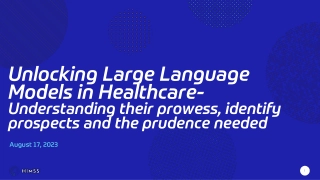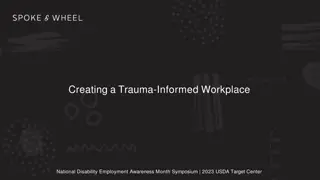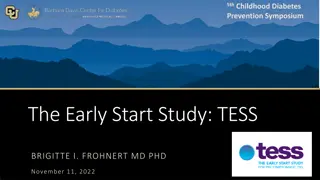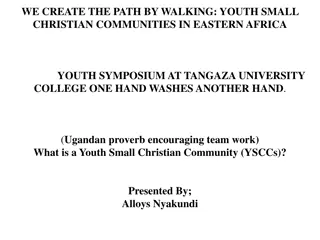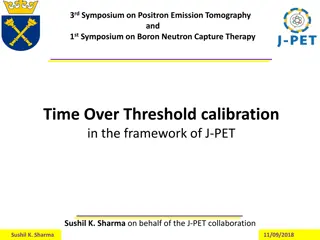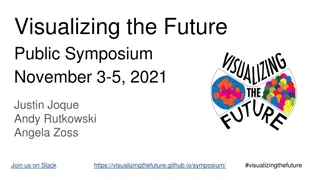
Balancing COVID-19 Challenges and Long-Term Treatment of Multiple Sclerosis
Join experts from around the world as they discuss perspectives on risks and benefits of disease-modifying therapies in the COVID-19 era, updates on COVID-19 vaccination in MS patients, and long-term treatment options for patients on cladribine tablets. Discover key insights and closing remarks from renowned speakers in the field.
Download Presentation

Please find below an Image/Link to download the presentation.
The content on the website is provided AS IS for your information and personal use only. It may not be sold, licensed, or shared on other websites without obtaining consent from the author. If you encounter any issues during the download, it is possible that the publisher has removed the file from their server.
You are allowed to download the files provided on this website for personal or commercial use, subject to the condition that they are used lawfully. All files are the property of their respective owners.
The content on the website is provided AS IS for your information and personal use only. It may not be sold, licensed, or shared on other websites without obtaining consent from the author.
E N D
Presentation Transcript
Balancing COVID-19 challenges and long-term treatment of multiple sclerosis 21 June 2021 18:30 20:00 CEST This meeting has been initiated, funded and organized by Merck Healthcare KGaA and is not intended for US HCPs GL-MAV-00436 | June 2021 The full cladribine tablets (February 2021) EU SmPC is available at: https://www.ema.europa.eu/en/documents/product-information/mavenclad-epar-product-information_en.pdf
Our speakers today Chair: Speakers: Eric Thouvenot Anat Achiron Ruth Dobson Bassem Yamout Klaus Schmierer Professor, Centre Hospitalier R gional et Universitaire de N mes, N mes, France Consultant Neurologist and Professor, Barts and The London School of Medicine and Dentistry, Queen Mary University, London, UK Professor, Director and Chair of the Multiple Sclerosis Center at the Sheba Medical Center, Tel Hashomer, Israel Consultant Director, Neurology Institute at Harley Street Medical Center, Abu Dhabi, UAE, and Professor of Neurology, American University of Beirut Medical Center, Beirut, Lebanon Neurologist, Barts and The London School of Medicine and Dentistry, Queen Mary University, London, UK
Agenda Time Presentation title Speaker Welcome Chair: Eric Thouvenot (France) Perspectives on risks and benefits of DMTs in the COVID-19 era Klaus Schmierer (UK) 1 hr 15 mins COVID-19 vaccination in patients with MS: update from Israel Anat Achiron (Israel) COVID-19 vaccination in patients with MS: update from the UK Ruth Dobson (UK) What are the long-term options for patients treated with cladribine tablets? Bassem Yamout (Lebanon / UAE) 15 mins Closing remarks and chair-moderated Q&A Eric Thouvenot DMT, disease-modifying therapy; COVID-19, coronavirus disease 2019
Disclosures Consulting and lecturing fees, travel grants or unconditional research support from the following pharmaceutical companies: Actelion, Biogen, BMS, Genzyme, Merck Serono, Novartis, Roche, Sanofi-Aventis, Teva pharma Patent pending for biomarkers of neurodegeneration and neuroregeneration (WO 2013/124460 A1) and a patent pending for a diagnosis method of multiple sclerosis (EP18305630.8) Academic research support from PHRC, CHU Montpellier, CHU N mes, and ARSEP Foundation
Polling question How did COVID-19 change your management of MS? Please choose all that apply a) Increased use of telehealth compared with pre-COVID-19 era to provide care, including prescribing treatments b) Reduced frequency of laboratory and MRI testing for patients c) I am delaying administration of the next dose of treatment d) I have not changed my prescription habits COVID-19, coronavirus disease 2019; MRI, magnetic resonance imaging
Timeline of COVID-19 pandemic New confirmed cases as of 30 May 2021 (n=169,597,415) WHO region Region of the Americas African Region 750,000 Eastern Mediterranean Region European Region Southeast Asia Region New cases Western Pacific Region 500,000 Other 250,000 0 Dec Jan Feb Mar Apr May Jun 2019 2020 Jul Aug Sep Oct Nov Dec Jan Feb Mar Apr May 2021 Date of report Coronavirus (SARS-CoV-2) first identified in December 20191 WHO declared COVID-19 a pandemic, with over 1 million cases confirmed worldwide2,3 COVID-19, coronavirus disease 2019; SARS-CoV-2, severe acute respiratory syndrome coronavirus 2; WHO, World Health Organization 1. Centers for Disease Control and Prevention. https://www.cdc.gov/coronavirus/2019-ncov/cdcresponse/about-COVID19.html#:~:text=Coronavirus%20disease%202019%20(COVID,%2C%20in%20December%202019 [Accessed 4 June 2021]; 2. WHO. https://www.who.int/emergencies/diseases/novel-coronavirus-2019/interactive-timeline# [Accessed 4 June 2021]; 3. WHO. https://www.who.int/director-general/speeches/detail/who-director-general-s-opening-remarks-at-the-media-briefing-on-covid-19---11-march-2020 [Accessed 4 June 2021]
Timeline of COVID-19 pandemic New confirmed cases as of 30 May 2021 (n=169,597,415) WHO region Region of the Americas African Region 750,000 Eastern Mediterranean Region European Region Southeast Asia Region New cases Western Pacific Region 500,000 Other Global Data Sharing Initiative 250,000 Set up by the Multiple Sclerosis International Federation (MSIF) and the Multiple Sclerosis Data Alliance (MSDA) Industry partners are encouraged to support Central platform for data import, integration and data management Aims to achieve insights and steer decision-making during the pandemic 0 Dec Jan Feb Mar Apr May Jun 2019 2020 Jul Aug Sep Oct Nov Dec Jan Feb Mar Apr May 2021 Date of report Coronavirus (SARS-CoV-2) first identified in December 20191 WHO declared COVID-19 a pandemic, with over 1 million cases confirmed worldwide2,3 Health authorities and the MS community reacted quickly to issue treatment guidelines Registries for patients with MS and COVID-19 were established. Studies are ongoing4,5 COVID-19, coronavirus disease 2019; SARS-CoV-2, severe acute respiratory syndrome coronavirus 2; WHO, World Health Organization 1. Centers for Disease Control and Prevention. https://www.cdc.gov/coronavirus/2019-ncov/cdcresponse/about-COVID-19.html#:~:text=Coronavirus%20disease%202019%20(COVID,%2C%20in%20December%202019 [Accessed 4 June 2021]; 2. WHO. https://www.who.int/emergencies/diseases/novel-coronavirus-2019/interactive-timeline# [Accessed 4 June 2021]; 3. WHO. https://www.who.int/director-general/speeches/detail/who- director-general-s-opening-remarks-at-the-media-briefing-on-covid-19---11-march-2020 [Accessed 4 June 2021]; 4. Louapre C et al. JAMA Neurol 2020;77:1079 88; 5. Sormani MP et al. Ann Neurol 2021;89:780 9
COVID-19 susceptibility and outcomes in patients with MS Findings Highest hospitalization and mortality rates were in patients with no disease-modifying therapies, followed by B cell depleting agents (rituximab and ocrelizumab) Hospitalization was more common among patients with older age, a progressive disease course and more severe disability COVID-19, coronavirus disease 2019 Barzegar M et al. Neurol Neuroimmunol Neuroinflamm 2021;8:e1001
MS Data Alliance: Effects of DMTs on the immune system may result in a more severe COVID-19 disease course The risk of hospitalization by DMT among suspected/confirmed (solid line) and confirmed-only (dashed line) cases. DMTs compared with dimethyl fumarate, adjusted for age, sex, MS phenotype and EDSS 7 12 data sources in 28 countries were aggregated, including COVID-19 Clinical severity Hospitalization Admission to an ICU Requiring artificial ventilation Death 6 5 aOR (95% Cl) 4 3.29 3 2.43 1.79 2 1.56 1.80 1.06 1.10 1.00 1.62 0.89 0.86 0.82 0.85 1 0.64 0.67 1.13 1.01 1.00 1.03 0.89 0.82 0.88 0.69 0.66 0 Untreated 657 (28.1%) patients with suspected and 1683 (61.9%) patients with confirmed COVID-19 were analysed Interferons Glatiramer Fingolimod Untreated Alemtuzumab fumarate Rituximab Teriflunomide Cladribine Dimethyl Natalizumab Ocrelizumab acetate Othera Alemtuzumab CladribineDimethyl Fingolimod Glatiramer Interferons Natalizumab Ocrelizumab Rituximab TeriflunomideOther fumarate acetate Patients treated with ocrelizumab or rituximab, along with untreated patients, were more likely to be hospitalized compared with patients taking different DMTs Cladribine = cladribine tablets. aIncludes siponimod. *p<0.05; **p<0.001 aOR, adjusted odds ratio; CI, confidence interval; COVID-19, coronavirus disease 2019; DMT, disease-modifying therapy; EDSS, Expanded Disability Status Scale; ICU, intensive care unit Simpson-Yap S et al. medRxiv preprint 2021. https://www.medrxiv.org/content/10.1101/2021.02.08.21251316v1
Reported cases of COVID-19 occurring in patients receiving cladribine tablets 455 As of 14 May 2021, 455 confirmed or suspected cases of COVID-19 occurring in patients treated with cladribine tablets have been reported to the Merck safety database COVID-19 casesa 275 confirmed cases 174 suspected cases Sex: 196, 62 , 17 unknown Sex: 98 , 26 , 50 unknown 15 cases 43 cases considered serious: Medically significant, n=5 Hospitalization, n=8 Fatal, n=2 considered serious: Medically significant, n=11 Hospitalization, n=32 232 non-serious cases 159 non-serious cases The majority of cases of COVID-19 in patients treated with cladribine tablets with known outcomes have had a moderate disease course Outcomes for non-fatal cases Recovered, n=90 Recovering, n=41 Not recovered, n=20 Not resolved, n=5 Not reported, n=76 Recovered, n=44 Recovering, n=12 Not recovered, n=6 Not resolved, n=6 Not reported, n=91 Recovered, n=21 Recovering, n=14 Not recovered, n=2 Not reported, n=6 Recovered, n=3 Recovering, n=3 Not reported, n=7 Medically significant specified by the case reporter. Not recovered and Not resolved are the current outcomes at the time of report (14 May 2021). For simplicity of presentation, the outcome Not reported also includes those with missing or pending outcomes aIncludes six patients with compatible COVID-19 symptoms but not evaluated further given negative PCR tests COVID-19, coronavirus disease 2019; PCR, polymerase chain reaction Merck Healthcare KGaA. Data on file
Did the pandemic change MS management? Use of telehealth to provide care for patients with MS (n=82)1 100 Klaus Schmierer Bassem Yamout 80 participants (%) Proportion of 60 53.8% 40 46.2% 20 0 <50% of the time 50 100% of the time Frequency of laboratory and MRI testing (n=42) 100 participants (%) Proportion of 80 60 54.8% 40 Perspectives on risks and benefits of DMTs in the COVID-19 era What are the long-term options for patients treated with cladribine tablets? 40.5% 20 26.2% 0% 0 More frequent laboratory testing Less frequent laboratory testing More frequent MRI testing Less frequent MRI testing COVID-19, coronavirus disease 2019; DMT, disease-modifying therapy; MRI, magnetic resonance imaging 1. Morrison EH et al. Mult Scler Relat Disord 2021;51:102913
As of 10 June 2021, a total of 2,092,863,229 vaccine doses have been administered1 Share of people who received at least one dose of COVID-19 vaccine2 Share of the total population who received at least one dose of the vaccine. This may not equal the share of people who are fully vaccinated if the vaccine requires two doses Anat Achiron Ruth Dobson Israel 60% UK 50% USA Germany 40% Italy France 30% Brazil 20% India 10% COVID-19 vaccination in patients with MS: updates from Israel and the UK 0% 19 Dec 2020 15 Jan 2021 4 Feb 2021 24 Feb 2021 16 Mar 2021 5 Apr 2021 25 Apr 2021 25 May 2021 COVID-19, coronavirus disease 2019 1. WHO. https://covid19.who.int/ [Accessed 10 June 2021]; 2. Our World in Data. https://ourworldindata.org/covid-vaccinations [Accessed 4 June 2021]
Polling responses How did COVID-19 change your management of MS? Please choose all that apply a) Increased use of telehealth compared with pre-COVID-19 era to provide care, including prescribing treatments b) Reduced frequency of laboratory and MRI testing for patients c) I am delaying administration of the next dose of treatment d) I have not changed my prescription habits COVID-19, coronavirus disease 2019; MRI, magnetic resonance imaging
Treatment considerations when choosing a disease-modifying therapy remain the same1,2 Safety profile, including infection risk Efficacy, including patients with high disease activity Balance between safety and efficacy Dosing regimen Monitoring requirements 1. Finkelsztejn A. Perspect Medicin Chem 2014;6:65 72; 2. Giovannoni G. Curr Opin Neurol 2018;31:233 43


